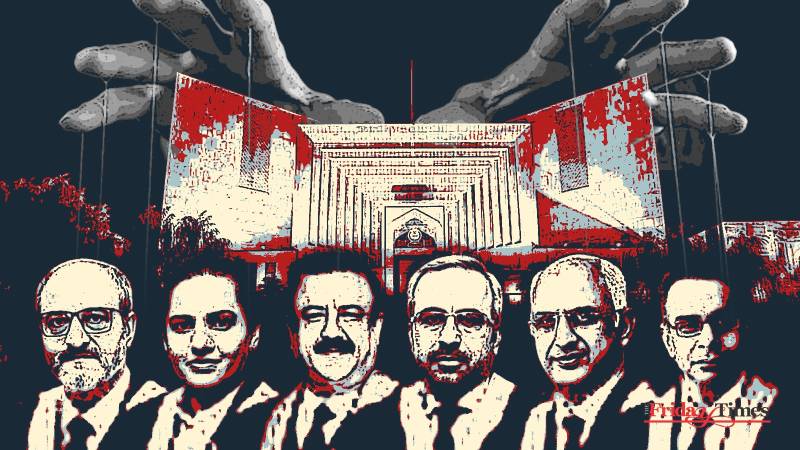
Against a dreary situation, where political parties, mainstream media and state institutions have all accepted the establishment’s political hegemony, the letter by six judges of the Islamabad High Court (IHC) on judicial interference by spy agencies has come as a faint ray of hope for the establishment of the rule of law. It is the strongest act of defiance by judges after the 2007 refusal to accept Musharraf’s emergency rule in 2007. The junior judges, with five confirmed as judges only in the last two years, represent a new generation of judges unwilling to toe the establishment’s diktat.
After a break of several weeks, the Supreme Court will resume hearing on the matter based on recommendations requested from different stakeholders on how to curb it. Unfortunately, the Supreme Court did not request recommendations from judges of the lower courts, who face the brunt of such interference. This article presents some recommendations in this regard.
Many analysts are arguing that judges already have sufficient powers to take Contempt of Court action against spy officials pressurizing them. However, given how covertly spy agencies work, in many cases, such pressure is applied discreetly so that the identity of the person remains unknown, and contempt action cannot be taken. Secondly, lower courts, which face the brunt of such pressure, have no contempt powers. Even within high courts, the power lies with the Chief Justice. The six judges had requested their Chief Justice to initiate action against some perpetrators whose identities were known, but he failed to do so.
Going forward, two types of action are needed: punishing specific individuals for past transgressions and ending future interference
Finally, the punishment under contempt laws is limited to only six months imprisonment and fines, which is grossly inadequate against the serious crimes committed by spy agencies in applying pressure on judges, such as kidnapping relatives and placing cameras in their houses.
Interference by spy agencies in the work of judges is not just an attack on a few judges but on the judicial independence of the whole system and even civilian supremacy, as it is usually done to rig elections through false case verdicts as against PML-N in 2017-18 and PTI in 2023-24. Thus, leaving the matter to individual judges or courts to deal with through the weak tool of contempt of court laws is an inadequate response where the interference is not by random individuals but by a major department of the state itself and has been going on for decades. What is required is a response not just by the whole judiciary but also by the executive, parliament and all pillars of society.
Going forward, two types of action are needed: punishing specific individuals for past transgressions and ending future interference. It may not be easy to find sufficient, court-quality evidence to punish past transgressors given that investigation will still be done by state agencies who may be unwilling to proceed against powerful intelligence officials and also given how covertly intelligence agencies work. Yet, the Supreme Court must make an effort to do so through a judicially-supervised investigation. The evidence available with the six judges and with Justice (retired) Shaukat Aziz Siddiqui must be probed further.
Also, it is critical to question under oath all judges who gave dubious verdicts against Nawaz Sharif earlier and Imran Khan now, which are now all slowly being reversed, to see whether they were under any pressure in giving those verdicts.
Media and lawyer bodies must also institute joint bodies to closely monitor high-profile political cases and raise the ante if they see suspicious proceedings
But there is sufficient common sense evidence from this case and past ones that such interference happens and for the Supreme Court to take strong action to stop it. To ensure adequate steps, it must be remembered that such interference is not done by intelligence agencies on their own but in response to demands by their bosses in the establishment as part of their plans to rig elections to keep out of power an adversarial political party. Also, given the coordinates of our major parties, it is more likely to affect courts in Punjab, Islamabad and Khyber Pakhtunkhwa. Politically influenced decisions have so far been issued by lower courts there but also by the Supreme Court itself against the PML-N and PTI.
Such action must include both, demand-side action to curb demands by spy agencies as well as supply-side action to reduce acquiescence by judges. Demand-side steps to reduce the ability of intelligence agencies to interfere include the formulation of clear laws on their functions; transparency about their budgets and structures, regular reporting by the executive to a bipartisan parliamentary panel, Supreme court and media on steps taken to curb such meddling, and the establishment of a long-term mechanism by courts to monitor such steps. There must also be a law strictly banning intelligence officials from contacting judges directly or indirectly.
Supply-side steps to reduce judges’ acquiescence include having a section in judges’ code of conduct making it mandatory for all judges to report meddling with failure to do so attracting prosecution; regular awareness raising for judges, especially lower court ones, on this issue; clear mechanisms in courts to transparently record complaints by judges, take immediate action and report it to parliament and media; institution of multiple senior judge benches for high profile political cases; reminders to such benches to immediately report any meddling and close monitoring of any deviations from set procedures in such cases. Media and lawyer bodies must also institute joint bodies to closely monitor high-profile political cases and raise the ante if they see suspicious proceedings.
It is also critical that other judges, journalists, bureaucrats, etc., facing such pressures from intelligence agencies should step forward immediately to help build further pressure on the government and courts to take these steps. Only through such concerted and sustained efforts by society can such meddling be ended permanently.

